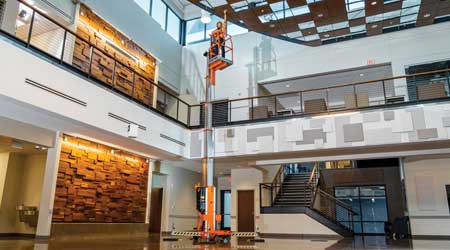 In making equipment decisions that involve researching a unit’s size, reach and lifting capacity, managers also need to keep in mind that technicians require training on the safe and effective use of MEWPs.
In making equipment decisions that involve researching a unit’s size, reach and lifting capacity, managers also need to keep in mind that technicians require training on the safe and effective use of MEWPs.Understanding MEWPs Options To Deliver Access, Safety
Manufacturers offer strategies and tactics managers can use in selecting training on mobile elevating work platforms
Managers have a range of options when it comes to selecting the most appropriate source of training, as well as where and when it can take place.
“There are multiple MEWP training formats available, including classroom, online and on site,” Deatherage says. “However, not all formats are available from all providers, so managers would need to review what options are available to them through their known provider or in their locality.
“The choice of training platform would then be subject to practical and logistical considerations, such as the ability of the trainee to travel to a training provider, whether multiple personnel can be made available to attend a session together, or if it would need to be delivered on an individual basis. While all forms of training can be effective, managers should ensure the trainees are afforded sufficient time and focus to take full advantage of the opportunity and ideally have some hands-on time on the equipment under the instruction of a qualified trainer.”
Managers who traditionally have relied on one type of training should consider their options, given the variety of platforms and locations available. They also need to be aware that each option presents pros and cons.
“Instructor-led classroom training provides an open platform that allows for interactive discussions and often opens the door to topics that are not typically addressed in other training formats,” Owyen says. “However, it pulls all of the participants from their workday at the same time for four to eight hours, depending upon the type of class, which is difficult for some organizations to afford to do.
“The benefit of online training is that it allows each individual to access the learning at their convenience and at their own pace. However, they lose the ability to converse with the instructor and ask clarifying questions in person, although they typically do have access to an expert via email or online chat.”
The first place many managers start in the search for training is reviewing manufacturer offerings.
“Most MEWP manufacturers offer training at all levels, from operator training to train-the-trainer programs to their distributors and resellers,” Deatherage says. “We would recommend that managers contact their local approved MEWP equipment distributor or rental company, or contact the manufacturer directly to learn about the training provisions that they offer. Many companies will have pre-bookable classes available, and in some cases, these will be delivered by the manufacturers’ factory personnel.”
Owyen stresses the importance of finding practical, applicable training that ensures safe, efficient MEWP operation.
“Regardless of the platform that is used for the general training, it is critical that all participants still receive practical hands-on training on a MEWP from a qualified trainer in order to complete their qualification process,” Owyen says. “Both aspects are equally important to ensure that the participants are properly trained to operate the equipment safely.”
Related Topics:












